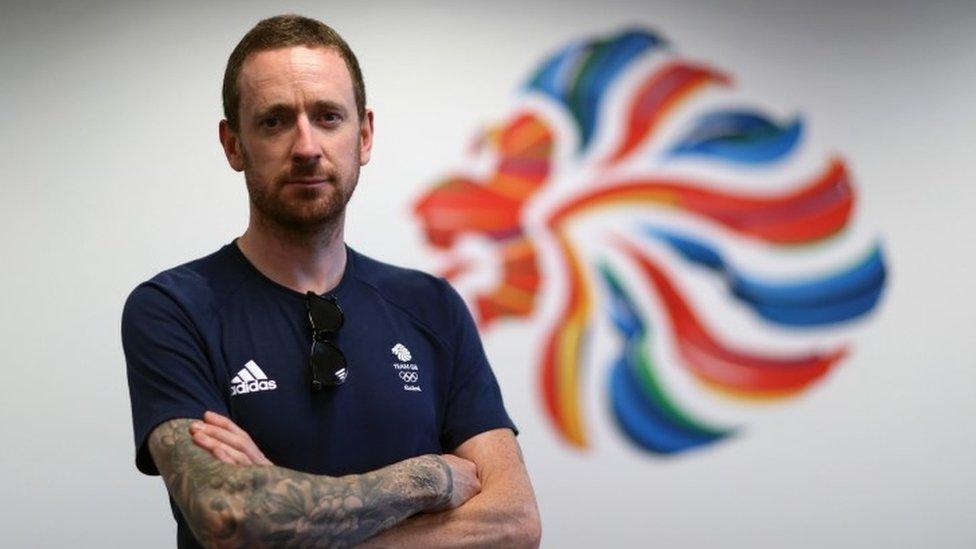Doping: Cycling chiefs criticised by anti-doping chief over evidence to parliament
- Published
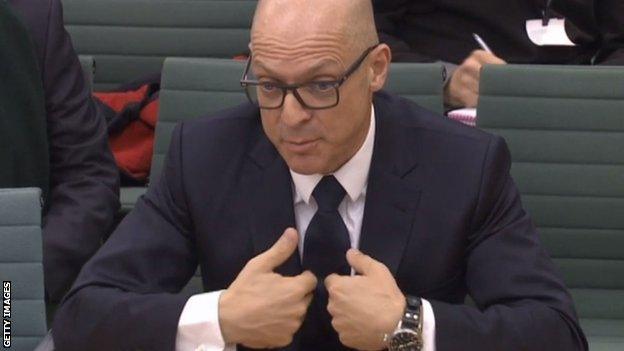
Sir Dave Brailsford was questioned by the panel of MPs for almost an hour at last month's hearing
Evidence given by cycling chiefs including Sir Dave Brailsford to a parliamentary select committee has been described as "extraordinary" by the chairman of UK Anti-Doping (Ukad).
David Kenworthy told the BBC that the answers presented by figures within British Cycling and Team Sky to the Commons' Culture, Media and Sport Select Committee on anti-doping - specifically about a mystery medical package delivered to Sir Bradley Wiggins - were "very disappointing".
Kenworthy, who is stepping down from his Ukad role soon, also says Russia should be banned from the 2018 Winter Olympics after a report into state-sponsored doping in the country.
He said the International Olympic Committee (IOC) had made "a complete muck-up" by not suspending the entire Russian team from the Rio Games last summer.
Ukad has been investigating allegations of wrongdoing in cycling after it emerged that a mystery medical package was delivered to a Team Sky doctor for Wiggins on the final day of the 2011 Criterium du Dauphine, which the Briton won.
In December, team boss Brailsford told MPs on the select committee he had been informed by former Team Sky medic Dr Richard Freeman that the package contained a legal decongestant called Fluimucil.
British Cycling president Bob Howden had told MPs he did not know the identity of the package, delivered by Simon Cope - a coach then employed by the governing body - but that documentary evidence of the medication would be supplied.
Brailsford also suggested that Wiggins' medical records had been provided to Ukad, verifying his explanation.
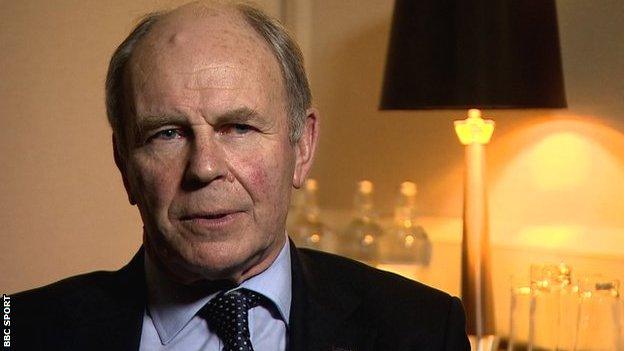
Kenworthy is the outgoing chairman of UK Anti-Doping
However, Kenworthy - who has been chairman of Ukad since its establishment in 2009 - said: "There's still no definite answer from anyone who was involved. I still don't know what was in there; I'm no nearer finding out than you are.
"People could remember a package that was delivered to France, they can remember who asked for it, they can remember the route it took, who delivered it, the times it arrived. The select committee has got expense sheets and travel documents.
"So everybody can remember this from five years ago, but no-one can remember what was in the package. That strikes me as being extraordinary. It is very disappointing."
When asked about Brailsford's Fluimucil explanation, Kenworthy said: "Well that's what Dave Brailsford came out with at the hearing. But actually, if you recall, he didn't say: 'I know that's what it was'. He said: 'I have been told that's what it was'.
Cope has previously said he did not know what was in the Jiffy bag he was asked to deliver to France.
When asked if British Cycling should have kept records of medication taken abroad by one of its coaches, Kenworthy said: "One would think so, one would hope so.
"Here's an individual [Cope] who's carrying a package containing medicine across international boundaries, and he's no idea what's in them.
"One could say he could be putting himself at risk if they are drugs which one could not properly transport. Someone should be inquisitive enough to say: 'Well what is it I'm actually taking?'"
Kenworthy's comments are likely to increase pressure on Brailsford, who has faced intense scrutiny since his appearance before the select committee, with critics questioning why Team Sky had an innocuous decongestant delivered all the way from their Manchester headquarters to France, when it could have been easily sourced locally.
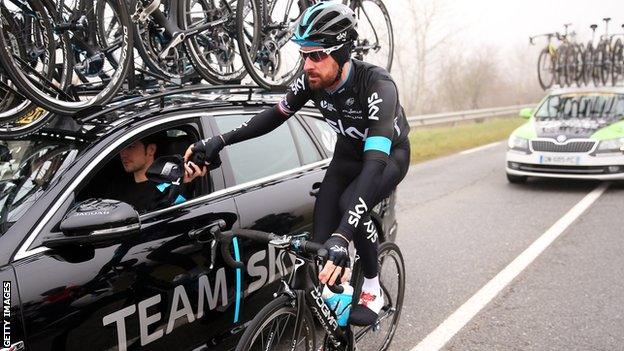
Sir Bradley Wiggins is Britain's most decorated Olympian
Brailsford has admitted "badly" handling the crisis after providing initial explanations for the delivery to the Daily Mail that later turned out to be wrong.
Committee chairman Damian Collins MP has said witnesses may be recalled, along with new ones.
"We're not giving up on this, and we'll dig and delve and find out what was in that package," warned Kenworthy.
British Cycling say they cannot comment while a UK Anti-Doping investigation is ongoing.
However, Team Sky said: "As we have said from the start, we are confident that there has been no wrongdoing. We are continuing to co-operate fully with Ukad and we look forward to the conclusion of the investigation."
Wiggins - Britain's most decorated Olympian - has been under scrutiny after he was granted a therapeutic use exemption (TUE) to take powerful anti-inflammatory drug triamcinolone before the 2011 Tour de France, his 2012 Tour win and the 2013 Giro d'Italia.
His use of the corticosteroid, revealed by Russian computer hackers, had been approved by British authorities and cycling's world governing body, the UCI. There is no suggestion that either he, British Cycling or Team Sky have broken any rules.
Wiggins announced his retirement last month, and Kenworthy said: "One of the tragedies of all this is you've got probably one of the greatest cyclists that the UK has produced, who's just coming to his retirement, and all the talk is not about the successes that he's had, but about this package.
"It just undermines yet again the joy of sport."
Sir Dave Brailsford was interviewed by the BBC on 26 September
'More extraordinary than a James Bond novel'
Kenworthy also waded into the debate surrounding the recent Russian doping scandal, saying he was "absolutely horrified" by last month's damning Wada independent report by Canadian law professor Richard McLaren into state-sponsored cheating.
The report alleged that more than 1,000 Russians benefited from a doping cover-up between 2011 and 2015, and that the London Olympics were "corrupted on an unprecedented scale".
Following an initial report last summer, the IOC refused demands to suspend Russia from the Rio Olympics, but when asked whether the country should now be banned from the next Winter Olympics in 2018, Kenworthy said: "Yes, I think they should. I think they should have been banned from the Olympics in the summer.
"The International Paralympic Committee in my view got it right - they banned Russia. I think the IOC made a complete muck-up of it.
"There was too much politicking going on, that was the problem. People were probably trying to protect vested interests. It's so important that we get this right because we are in danger of losing the confidence of spectators. If they stop going what's the point of having sport. I was lukewarm [about Rio] because I'd seen the Russian thing.
"It was just extraordinary what was done. It's more extraordinary than a James Bond novel, and it just debases all of sport.
"We're still getting denials of any wrongdoing and strange statements about whether it was state-sponsored or not - what we now need to do is get Russia back in the fold, and that is taking some considerable time and effort."
- Published26 September 2016
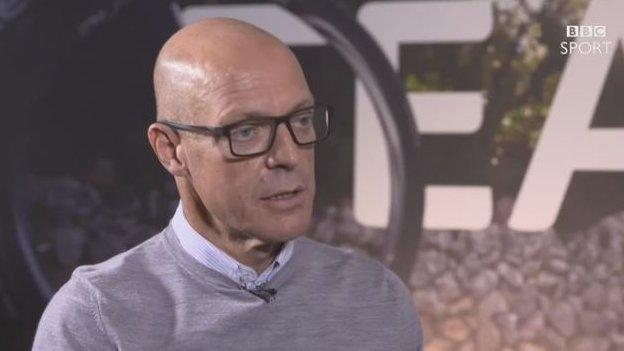
- Attribution
- Published25 September 2016
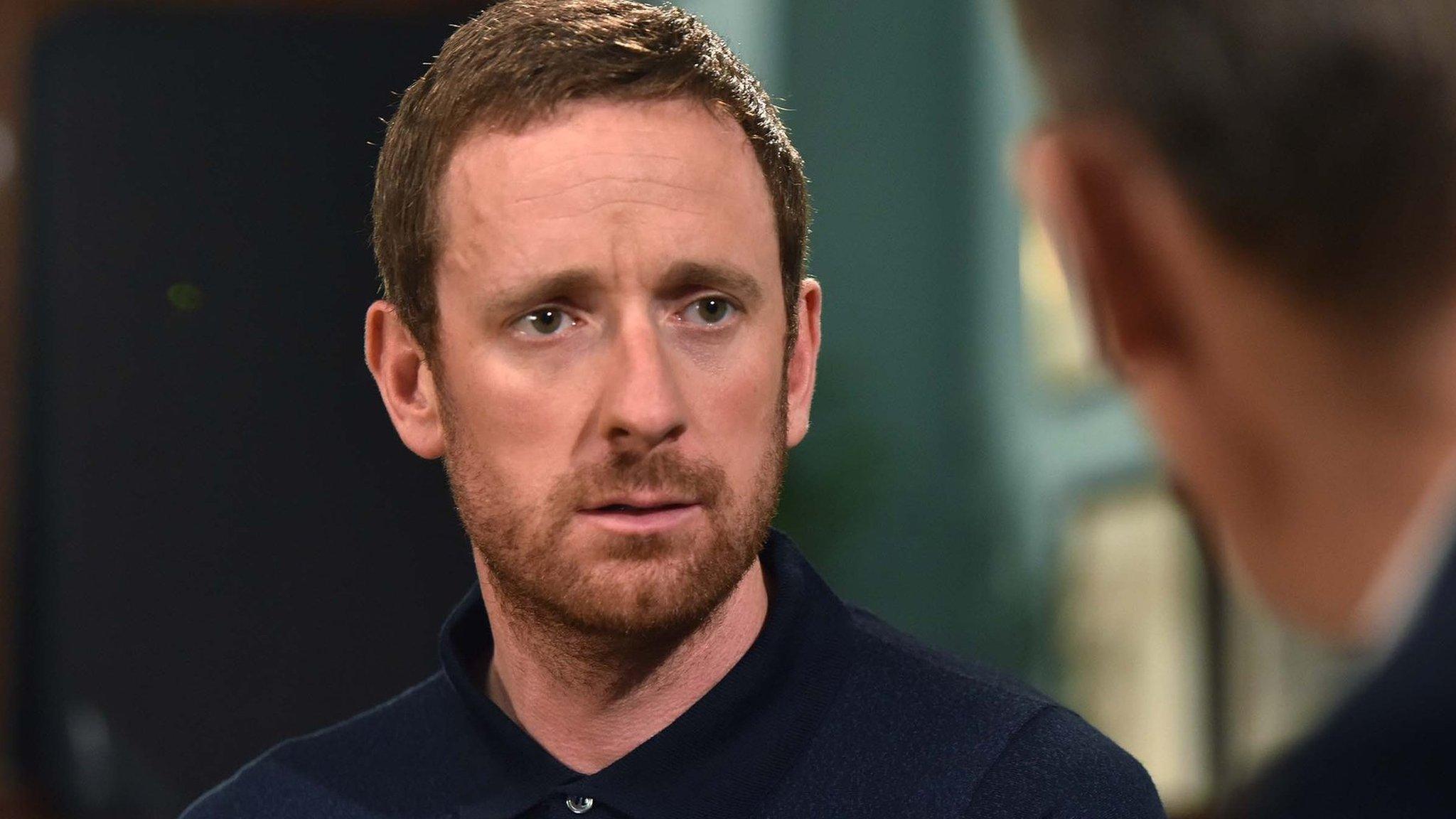
- Attribution
- Published23 September 2016
